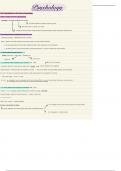Samenvatting
Summary Inleiding tot de Psychologie ; Peter gray ; Hoofdstuk 1-8
Dit document is een samenvatting (In het Engels) van de eerste 8 hoofdstukken van het boek "Psychology" door Peter Gray & David F. Bjorklund. De samenvatting is volledig en gedetailleerd genoeg en het vat 300 Pagina's samen in maar 56 Pagina's. Ook wordt er gebruik gemaakt van plaatjes en kleuren o...
[Meer zien]





